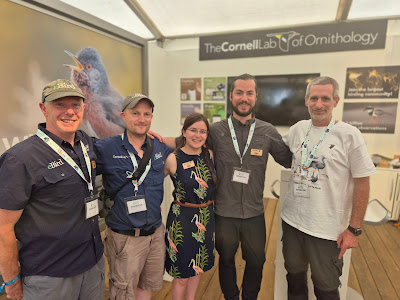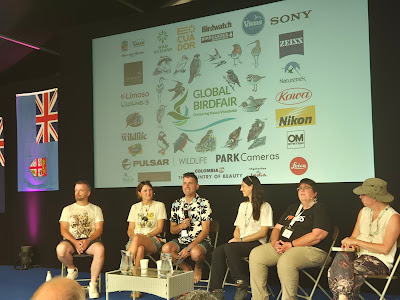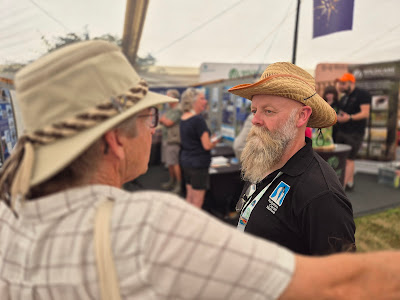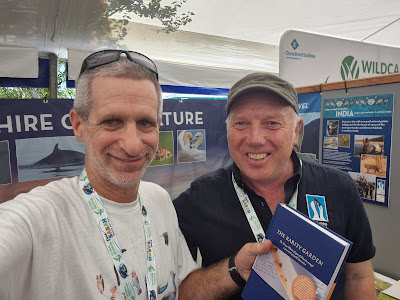I’m late to the party, but in this case, better late than never.
Over the weekend of 11–13 July, I took part in the world’s largest birding event – Global Birdfair, held in Rutland, UK. You may recall that last year I grumbled about not attending. This year, I decided to go – not because the hostages kidnapped by Hamas on October 7th were released, the war Israel is embroiled in has not ended, and certainly not because Israel is drawing less criticism these days given the horrific outcomes of its actions in Gaza. I went because Global Birdfair is THE place to be.
Anyone who’s experienced it knows the unique power of this event – uniting leading birders, conservationists and nature lovers from around the world. The professional, seamless organisation and inspiring leadership by Tim and Penny – or rather, Penny and Tim – played a huge part in making the experience so enjoyable. On the flip side, the FOMO when you’re not there is real – hence my whining last year.
If you’ve never been to Global Birdfair, I highly recommend this excellent YouTube video by Simon McCabe – it gives a great sense of the atmosphere and scale of the event.
This year brought a new experience for me at Birdfair. For many years, I’ve attended as a representative of BirdLife Israel, promoting birding in Israel, our conservation work, and international events like Champions of the Flyway. This year, I wore a different hat – representing the Cornell Lab of Ornithology, promoting Birds of the World and other brilliant Cornell projects like Merlin, eBird, and the Macaulay Library. If you missed my recent update on Facebook: since January 2025 I’ve been working with Birds of the World, in parallel to my role at BirdLife Israel, helping expand the project’s reach across Europe.
At Global Birdfair, I took the opportunity to connect with many key partners – existing, emerging, and potential – including organisations, institutions and individuals. It was a privilege to join the fantastic Cornell team. Our stand, adjacent to Swarovski Optik, was buzzing with activity. Interest in the Lab’s work was immense – and I was truly taken aback by how wildly popular Merlin has become. It seems everyone had it on their phones! It’s inspiring to see how many people are taking their first steps into nature through Merlin – their pocket birding companion.
Alen Kacal from my team at BirdLife Israel was also at Birdfair. I joined all her events and represented BirdLife Israel at several BirdLife International meetings. I was pleasantly surprised by the widespread warmth and appreciation towards Israel – for its birding and for its people. It gave me a sliver of hope that this horrific war might one day end, that stability may return to our region, and that international birders will once again come to witness the miracle of migration in Israel. Here's Alen participating in a panel discussion on the healing power of nature, brilliantly moderated by Nick Acheson:
For me, Global Birdfair is ultimately about people and friendships. It was wonderful to reconnect with so many old friends – some whom I hadn’t seen in years. In previous years, my phone nearly burst with selfies. This time, for some reason, I didn’t bother – so I don’t have many photos. I also won’t be tagging a million people on Facebook. I’ve become a little less social media-savvy of late. These two fine Yorkshiremen deserved attention:
As always, given the timing and location, birding wasn’t the main attraction at Global Birdfair – especially in the extreme heat. On Friday, temperatures reached 35°C outdoors, and inside the tents it felt like a stifling 50°C. Still, I had to keep my checklist streak alive, so birding was done!
I enjoy birding Rutland Water, even during the quiet season. It's very pleasent. The volume of birds is impressive. My only notable sighting was a group of Bearded Titlings calling from a reedbed not far from the visitor center. I hadn’t realised how rare they are at Rutland Water, so didn’t attempt a recording or photo – my mistake. I was later contacted by the regional eBird reviewer requesting more details – we’ll see what comes of that.
Another amusing eBird moment involved Feral Pigeons. In Israel, every early morning session at this time of year includes flocks of hundreds, often thousands, of Feral Pigeons flying between cities and surrounding farmland. So, when I was birding in Rutland and noticed a few flocks flying over, I casually logged 300 on eBird. Soon after, a reviewer contacted me – apparently, this isn’t normal in Rutland. They’re likely racing pigeons, which shouldn’t be reported on eBird. Odd, I admit – but I accepted the suggestion and removed them from my checklist. That’s a first – being challenged on Feral Pigeons!
After Birdfair, I made a quick dash to Norwich and Norfolk before flying home. I stayed overnight with good friends in Norwich, and the next morning (July 14th) I birded Cley Marshes. It was quite pleasant, with a few early migrant shorebirds – Curlew Sandpiper and Wood Sandpiper being the most exciting.
The only bird I photographed during the whole trip was a Cattle Egret. Boring?
I am amazed at how rapidly they’ve colonised the UK. I vividly remember a wet August 12th 2008, post-Birdfair (then still called British Birdfair). I was sitting in a hide at Cley with Steve Gantlett and my brother Gidon, when a Cattle Egret dropped out of the grey sky onto the scrape in front of us.
Back then, Cattle Egrets were seriously rare in the UK – indeed within minutes dozens of birders twitchers arrived to see them. My brother and I jokingly predicted they’d quickly spread across the country, and even suggested they should be 'stopped' before it was too late – thinking of the ecological damage they’ve caused in Israel’s wetlands and rangelands. Our comments earned a few scowls from grumpy twitchers in the hide. Seventeen years later, that colonisation is well underway. I’m not sure whether the ecological impact of Cattle Egrets – or other expanding herons like Great Egrets – on UK habitats has ever been studied.
Back to 2025, from Cley, I visited friends in Sheringham, then headed to Luton Airport and flew back home.
My full eBird trip report is here.
See you at Global Birdfair 2026!








